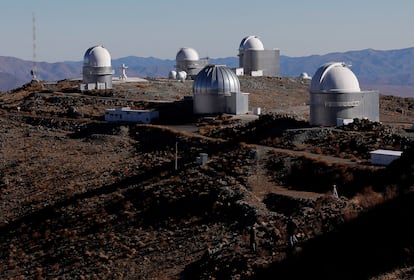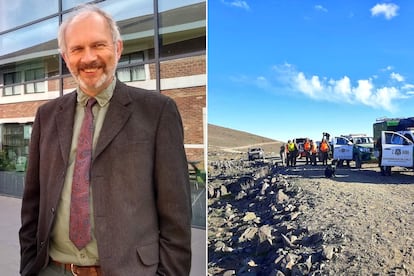Body of missing British astronomer Thomas Marsh found in Chile
After a 55-day search, police located the remains near La Silla Observatory in the Atacama Desert. The cause of death is still unclear; a student who traveled with him said the scholar acted strange the night before


A specialized unit of Chile’s police on Thursday located the body of British astronomer Thomas Marsh, 61, who had been missing for 55 days, in the outskirts of the Atacama Desert. The cause of death remains unclear.
The body was found in the vicinity of La Silla Observatory, in the Coquimbo region in northern Chile, famous for its clear skies and for hosting a large number of observatories. Marsh, a professor at Warwick University, had traveled to the site on September 14 for research work as a visiting scholar. He’d been planning to stay four nights, but was seen for the last time on the 16th. Since then, continuing search efforts had produced no results.
On Thursday, members of the Carabineros, Chile’s national police, reported finding the body shortly before noon among a cluster of rocks near La Silla. “After an intense search by the Carabineros’ multidisciplinary team, Gope (a specialized unit) found the lifeless body of the astronomer missing since September 16. We lament giving this sad news and extend our condolences to his family and friends,” said the law enforcement agency in a Twitter post.
🚨 Ante intensa búsqueda de equipo multidisciplinario de Carabineros, #Gope #Coquimbo encontró el cuerpo sin vida de astrónomo extraviado desde el 16 de septiembre.
— Carabineros Región de Coquimbo (@CarabCoquimbo) November 10, 2022
Lamentamos entregar esta triste noticia y expresamos nuestras condolencias a su familia y amigos. pic.twitter.com/s7O5gYOWfZ
“From the very beginning we made all our human and logistical resources available to collaborate with the investigation and provide answers to the family of the missing person,” said the head of the 4th Carabineros Zone, General Juan Muñoz. Local authorities had extended the search until November 15 after finding the academic’s cellphone and some of his clothes in the area. The body found on Thursday was undressed from the waist up.
In September, a colleague of Marsh’s based in Germany, Odette Toloza, noted that Marsh, a specialist in the accumulation and evolution of binary stars, had gone to Chile to make observations for four nights and that he knew “the terrain very well.” One of the investigation’s hypotheses is that the British researcher went out “trekking,” as the prosecutor Adrián Vega stated. On September 26, Vega said that the area was being combed with different types of technology, mainly drones, satellite images and people on the ground. He also noted that the area in question covers about 2,000 hectares.

Marsh’s wife and children arrived in Chile a few weeks ago to help with the search efforts. In a video released in late October by the Coquimbo Prosecutor’s Office, they made a heartfelt appeal to the local population to collaborate with the search. “Please help us find him. The best resource we have is you, the people who might have seen him,” his son said.
His daughter made a similar request to the population of La Higuera, the town where the observatory is located: “Try to familiarize yourself with my father’s face, try to remember him and look for him wherever you go. And please tell us if you see him or have seen him. Just one person would be enough.”
Besides recounting that Marsh was very happy to return to one of the best observatories in the world, where he had worked and taught many times, his wife said that they still hoped to find him alive: The woman spoke directly to her husband: “Wherever you are now, Tom, even if you are going through hard times, do not doubt for a moment that we love you very much and that we are with you at all times. We will always wait, but if you can, please tell us where you are.”
Familia de científico británico, extraviado en la zona norte de Coquimbo, efectuó un comunicado sobre la búsqueda que se impulsa desde la Fiscalía y con equipos desplegados en terreno. Familia autorizó difusión de este video (HILO). pic.twitter.com/KNEnGk39ly
— Fiscalía Regional de Coquimbo (@Fisca_Coquimbo) October 26, 2022
One of the main witnesses in the case has been a British student who traveled with Marsh to La Silla Observatory, where they’d been planning to carry out work with the NTT telescopes of the European Southern Observatory (ESO), which operates three observatories in the Atacama Desert region, including La Silla. In the days after the disappearance, this student collaborated with the police and provided testimony about the last few hours he spent with the professor. A Chilean news outlet with access to this testimony reported that the student told police that Marsh had told him “something super strange” on the 15th and had also rebuked him for what he considered his insufficient commitment to the profession. After collaborating with the investigation, the student returned to Britain.
La Silla Observatory has 18 telescopes. Its location, at about 2,400 meters above sea level, made the search for Marsh especially difficult, as it is a hard-to-access foothill area in the southern part of the Atacama Desert, the driest region in the world.
Tu suscripción se está usando en otro dispositivo
¿Quieres añadir otro usuario a tu suscripción?
Si continúas leyendo en este dispositivo, no se podrá leer en el otro.
FlechaTu suscripción se está usando en otro dispositivo y solo puedes acceder a EL PAÍS desde un dispositivo a la vez.
Si quieres compartir tu cuenta, cambia tu suscripción a la modalidad Premium, así podrás añadir otro usuario. Cada uno accederá con su propia cuenta de email, lo que os permitirá personalizar vuestra experiencia en EL PAÍS.
¿Tienes una suscripción de empresa? Accede aquí para contratar más cuentas.
En el caso de no saber quién está usando tu cuenta, te recomendamos cambiar tu contraseña aquí.
Si decides continuar compartiendo tu cuenta, este mensaje se mostrará en tu dispositivo y en el de la otra persona que está usando tu cuenta de forma indefinida, afectando a tu experiencia de lectura. Puedes consultar aquí los términos y condiciones de la suscripción digital.








































